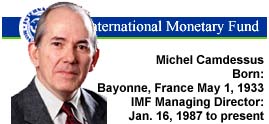|
IMF chief resigns
|
 |
November 9, 1999: 4:32 p.m. ET
Managing Director Michel Camdessus to step down from agency's top post
|
NEW YORK (CNNfn) - Michel Camdessus, managing director of the International Monetary Fund, turned in his resignation Tuesday, half way through his third five-year term as head of the global agency.
"The moment has come for me to ask you to discharge me of my responsibilities as managing director," an emotional Camdessus told reporters at a hastily arranged press conference in Washington. "It is the right time," he said, adding that he was resigning for "personal reasons." Camdessus will leave his post officially in mid-February.
His resignation comes in the wake of both praise and criticism of his iron-fisted rule of the world's largest and most influential fund -- praise for helping rescue the world from financial ruin following financial crises in 1997 and 1998, and criticism for not always bowing to consensus.
Praise and scorn
While at the helm of the IMF, Camdessus arranged for large amounts of capital and training to steer the countries of Central and Eastern Europe toward becoming free market economies, and IMF membership mushroomed to include virtually every nation in the world.
Indeed, most of the one-time Soviet bloc countries and the former Soviet republics joined the IMF during Camdessus' tenure. By 1999 the only significant countries not part of the IMF were Cuba, North Korea and Taiwan, the last only because IMF member China rejects the recognition of Taiwan as an independent state.

Camdessus is also credited with -- and criticized for -- arranging the largest bailout packages ever assembled for countries like Thailand and South Korea during the 1997 Asian financial crisis. All told, some $100 billion in financial aid has been distributed by the IMF to countries in Asia, Europe and Latin America.
And through it all Camdessus personally received much of the criticism, particularly from the U.S. Senate, whose conservative leaders saw as frivolous his plans to spend the IMF's money with what they perceived as little accountability. In 1998, majority Senate leader Trent Lott called for his resignation, referring to him as a "socialist from France."
Tough balancing act
But Camdessus always faced a tough balancing act between the demands of the IMF's rich backers, namely the Group of Seven industrialized nations, and those of its poorer states, as well as between inflation-conscious Europeans and growth-sensitive countries elsewhere in the world.
British Finance Minister Gordon Brown paid tribute to Camdessus Tuesday, saying he had made a "great contribution" in the almost 13 years he'd spent as managing director of the fund.
Treasury Secretary Lawrence Summers, on Capitol Hill for a hearing on Social Security, also praised the IMF leader. "He has provided very important and valuable leadership on a range of issues from the Latin American debt crisis in the 1980s to the challenge of the transition economies following the fall of the Berlin Wall to the emerging market challenges of recent years."
Speculation immediately surfaced over who might succeed Camdessus in the only job in the world whose holder is supposed to try to run the global economy. By tradition, the IMF has been headed by a European while its sister lending agency, the World Bank, is headed by an American.
A new leader?
Those whose names have been floated as possible successors include Italian Treasury Director Mario Draghi; French banker Philippe Lagayette, who lost out in 1998 to Germany's Horst Koehler as head of the European Bank for Reconstruction and Development; Bank of France head Jean-Claude Trichet; Britain's Gordon Brown and Basel-based Bank for International Settlements' General Manager Andrew Crockett.
Camdessus assumed office as managing director and chairman of the IMF in early 1987. On May 22, 1996, the IMF board unanimously selected Camdessus to serve a third five-year term.
Camdessus was educated at the University of Paris and earned postgraduate degrees in economics at the Institute of Political Studies of Paris and the National School of Administration.
He then made his way through a variety of government appointments in his native France, most notably governor of the Bank of France, to which he was appointed in November 1984. He served there until his appointment to the IMF.
Camdessus is the seventh managing director of the IMF. He was preceded by Camille Gutt (Belgium, 1946-51), Ivar Rooth (Sweden, 1951-56), Per Jacobsson (Sweden, 1956-63), Pierre-Paul Schweitzer (France, 1963-73), H. Johannes Witteveen (Netherlands, 1973-78), and Jacques de Larosière (France, 1978-87).
|
|
|
|
|
|
IMF
World Bank
|
Note: Pages will open in a new browser window
External sites are not endorsed by CNNmoney
|
|
|
|
 |

|

